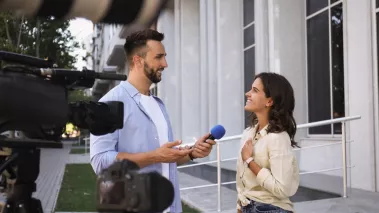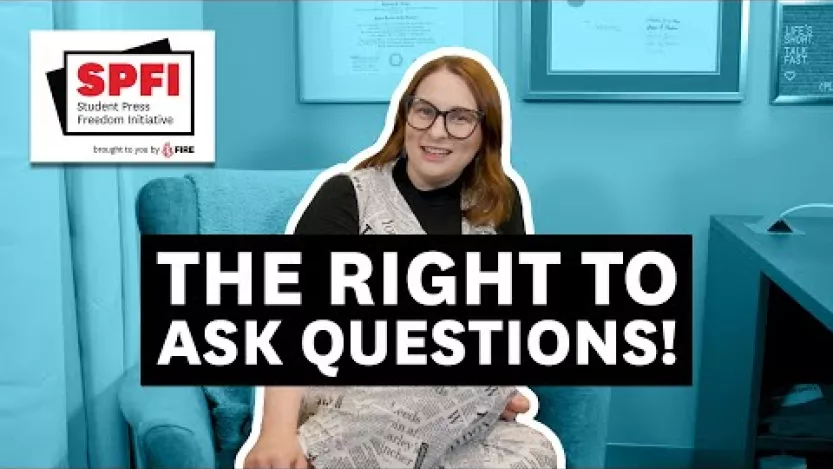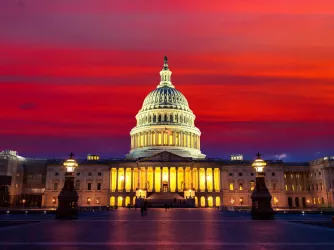Table of Contents
Do I have a right to interview sources employed by my college?

Shutterstock.com
Day and night, FIRE’s Student Press Freedom Initiative answers hotline calls from student journalists with questions about defamation, First Amendment issues, copyright, and more. Each month, in order to spread the knowledge we share on the SPFI hotline, we’ll highlight one question we answered and talk through ways student journalists across the country can think through these issues.
This month’s question: What rights do student journalists have to interview sources, especially those employed by their university?

The short answer: Journalists certainly have a general right to contact and speak with sources, and sources — including those who work at your university — often have a right to speak to journalists. Sources do not have a right to speak on behalf of the institution.
The long answer: This really needs to be broken down into two questions: (1) do you, as a student journalist, have a right to reach out to potential sources for interviews; and (2) do willing sources who work at your university have a right to give interviews without interference?
Do student journalists have a right to contact sources?
If you’re at a public institution of higher education, the answer to this question is unequivocally, yes! Public colleges and universities violate the First Amendment when they single out student journalists and attempt to regulate their ability to reach out to sources.
What might this kind of censorship look like? It might be a form your university requires reporters fill out for permission to contact a campus employee for an interview. It might look like a ban on student journalists emailing sources. Or it might be a requirement to route all requests for interviews through a particular office and to include a list of questions the journalist wants to ask.
As the First Amendment does not bind private colleges and universities, these institutions are free to set their own policies.
While public universities can request that you go through certain channels to interview campus employees, they cannot require it.
Legally speaking, public agencies — including public colleges and universities — cannot single out the press for worse treatment than their non-journalist counterparts. There’s Supreme Court precedent that tells us that. So ask yourself, can a regular, non-journalist student reach out to university employees by email or phone to request a time to meet? If the answer is yes, you can, too.
The situation is, as always, a bit different when we start thinking about private institutions. As the First Amendment does not bind private colleges and universities, these institutions are free to set their own policies. However, many private institutions boast robust policy commitments to expressive rights, sometimes even specifically committing to maintaining a free press on campus. When a private university has policies like these, they are contractually obligated to uphold them and are in a similar boat to public institutions: they cannot burden the ability of student journalists to reach out to campus employees any more than this right is burdened for non-journalists.
Do college and university personnel have a right to speak to student journalists?
Okay, so most student journalists have a right to reach out to sources. But do sources have a right to respond?
At public institutions, employees — including faculty, student employees, and other university staff — have the right to speak to reporters in their individual capacity on matters of public concern. In less lawyerly terms, employees can respond to you without getting administrative approval so long as they aren’t purporting to represent the university, and so long as the topic is something of public importance, not just, say, gossip about a personal dispute. Of course, colleges and universities can also prohibit employees from divulging confidential information. For employees whose duties don’t usually involve giving media interviews, it’s likely their response to interview requests will be in their individual capacities.
And this doesn’t mean that sources can’t mention their employment. The fact that they’re a resident assistant or a professor or a cafe worker is just that, a fact. As long as they don’t mention their title to make it seem as though their comment has official institutional endorsement, sharing what they do for a living is usually well within their rights.

Eastern Kentucky University latest campus to bar employees from speaking to journalists
News
Eastern Kentucky's media request policy for bans RAs from commenting “to any media source," which violates the rights of students and student journalists.
Just like with your rights to contact sources, a similar analysis applies to employee speech rights at private colleges and universities that guarantee the right to expression in their policies. At these institutions, we would expect personnel to enjoy the same freedoms as those at public institutions.
There’s another legal protection for private employees’ right to speak to reporters: The National Labor Relations Act. The NLRA protects employees’ right to “concerted activity,” which has been defined fairly broadly, and usually includes publicly discussing issues related to workplace conditions.
This means that private university employees usually enjoy protection when they talk about issues at their workplace: things like RAs discussing mold in their dorms, faculty discussing new university syllabus policies, or office employees discussing campus safety.
Colleges and universities — both public and private — can restrict the rights of their employees to speak to reporters on behalf of the institution. This means that institutional policies that require employees to fill out forms or otherwise get permission from campus officials before doing an interview representing the institution are generally allowed.
Too often, SPFI sees colleges restricting student journalists’ access to sources by placing unconstitutional restrictions on reporters or by silencing the sources themselves, hindering the ability of the student press to keep colleges and universities accountable. FIRE will continue to fight back against these censorial policies and practices, and student journalists who face these issues should give SPFI a call.
Are you a student journalist, student media staffer, or student media adviser with a legal question? Call SPFI’s hotline day or night at 717-734-SPFI (7734).
Recent Articles
FIRE’s award-winning Newsdesk covers the free speech news you need to stay informed.

One day after FIRE lawsuit, Congress passes changes to filming permits in national parks

VICTORY: FIRE lawsuit leads California to halt law penalizing reporters, advocates, and victims who discuss publicly known information about sealed arrest records

O holy fight: New Hampshire Satanic Temple statue threatened by more than vandals


